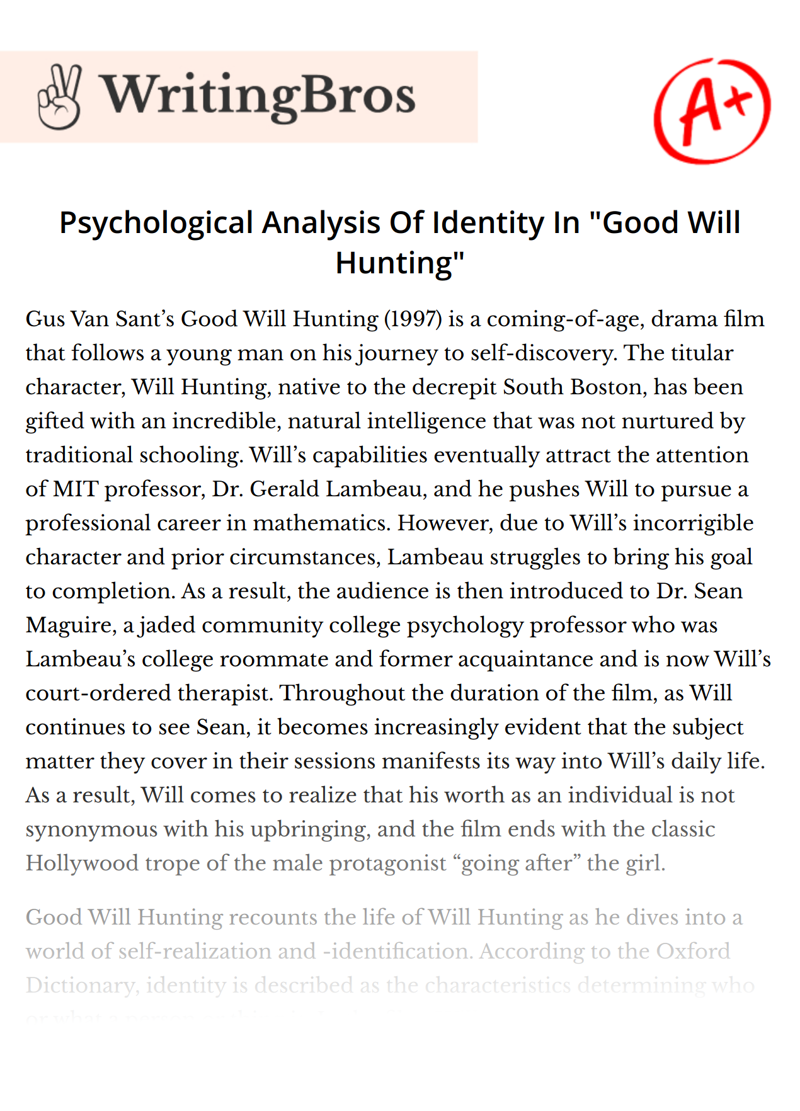Psychological Analysis Of Identity In "Good Will Hunting"

Gus Van Sant’s Good Will Hunting (1997) is a coming-of-age, drama film that follows a young man on his journey to self-discovery. The titular character, Will Hunting, native to the decrepit South Boston, has been gifted with an incredible, natural intelligence that was not nurtured by traditional schooling. Will’s capabilities eventually attract the attention of MIT professor, Dr. Gerald Lambeau, and he pushes Will to pursue a professional career in mathematics. However, due to Will’s incorrigible character and prior circumstances, Lambeau struggles to bring his goal to completion. As a result, the audience is then introduced to Dr. Sean Maguire, a jaded community college psychology professor who was Lambeau’s college roommate and former acquaintance and is now Will’s court-ordered therapist. Throughout the duration of the film, as Will continues to see Sean, it becomes increasingly evident that the subject matter they cover in their sessions manifests its way into Will’s daily life. As a result, Will comes to realize that his worth as an individual is not synonymous with his upbringing, and the film ends with the classic Hollywood trope of the male protagonist “going after” the girl.
Good Will Hunting recounts the life of Will Hunting as he dives into a world of self-realization and -identification. According to the Oxford Dictionary, identity is described as the characteristics determining who or what a person or thing is. In the film, Will and several other characters exhibit the element of identity in three major facets– identity through masculinity, intelligence, and socioeconomic status. By observing identity in Good Will Hunting through the lens of the psychological model, it reveals how this piece of media targets its audience to draw parallels between their own livelihoods and those of the characters in this film.
With the film having male-laden casting, identity is prevalent through the motif of masculinity. Masculinity is described to be the practice in which men engage in traditional, male social gender roles with its effects evident through the body, personality and culture. Masculinity is also not just defined in the way an individual is, but the interplay between the agency of the individual and the structure of the social constitution (Connell, 1995). Although masculinity is fluid and can be performed in many ways, more often than not, men feel obligated to perform masculinity aligning with the current cultural climate (Dunlap & Johnson, 2013). As an example, in Western society, a trait of masculinity presents itself in the securing and maintaining of dominance.
In media, although diverse masculinities are represented, through research, it is shown that strength, aggression and heterosexuality are frequently portrayed to be necessary masculine characteristics (Messner, 2002; White & Gillett, 1994). In Good Will Hunting, the “Southies”, otherwise known as individuals originating from South Boston, portray masculinity that is of traditional, masculine bravado where conflicts are resolved in the form of physical violence. This is evident in the scene where Will and his crew of friends instigate a brawl between old kindergarten bullies, resulting to Will’s arrest. This particular scene also exhibits a trait of masculinity that is specific to the South Boston area, which is blind loyalty with towards close family members and friends. Without hesitation, Will’s friends followed him to the altercation with little to no regard of the consequences, with the exception of Casey Affleck’s character, Morgan. Another example of this masculinity is present in the scene where a first-year Harvard graduate attempts to embarrass Will’s friend, Chuckie, in the bar by belittling him and drawing attention to his lack of education. Again, to settle this dispute, Will proposes that they can “take it outside”, implying physical violence.
In contrast, media portrayals of this kind are often accompanied by alternatives masculinities that assign stereotypical traits like passivity and weakness to female and some male characters (Kane & Lenskyj, 1998). An alternative masculinity in this film is evident through the “educated elite”, characters that are assumed to not participate in physical violence but rather peacock their academia, credentials, statuses. A characterised example of this would be Henry Lipkin, one of the many therapists that Lambeau had commissioned to be Will’s court-ordered therapist. Briefly after the start of their session, Will outs Lipkin as a homosexual because of the way his book was written, his vernacular, and how he generally carries himself, suggesting that he was effeminate. With the combination of homosexuality, elitism and ineffectiveness, it paints a narrative of the dismal portrayals of masculinity in the educated elite.
Intelligence, in whatever form it may come, whether it be innate, nurtured, superficial, or all of the above, is prevalent through many characters in the film and is a key factor to their identities. Intelligence is a general, mental capability that involves the ability to reason, solve problems, think abstractly, comprehend complex ideas, learn quickly and learn from experience. It reflects a broader and deeper capability for comprehending one’s surroundings (Gottfredson, 1997).
Cite this Essay
To export a reference to this article please select a referencing style below

